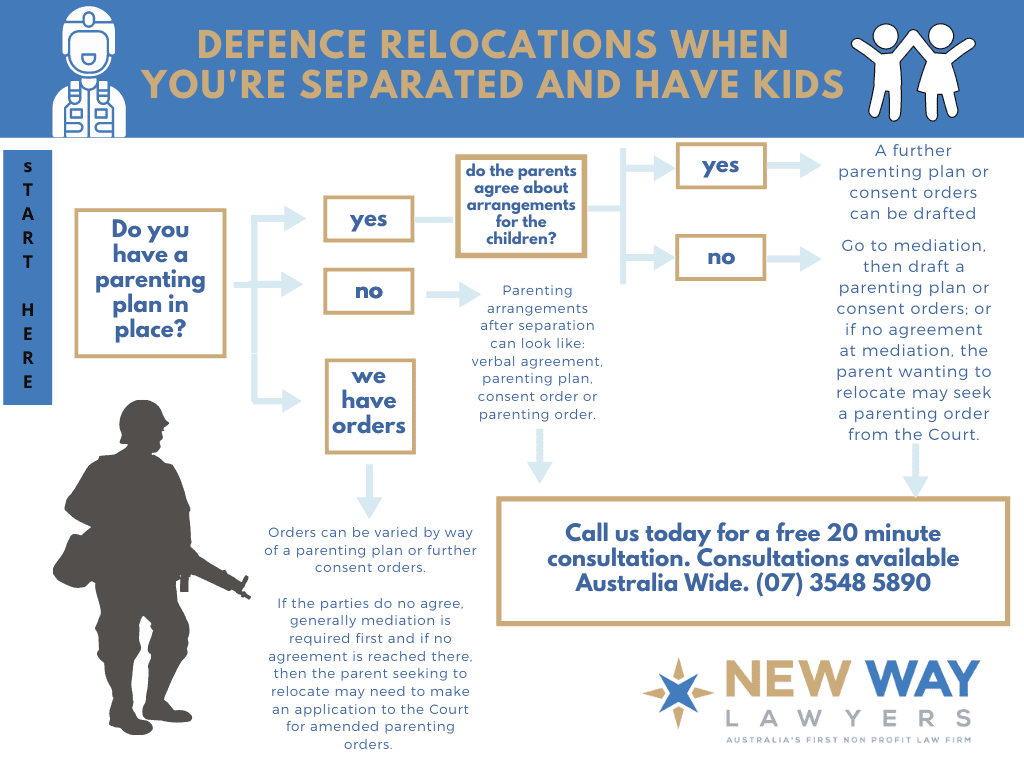-
Parenting Plans: What you need to know
March 28th, 2022 | by newwaylawyersAre you wondering what issues can be included in a parenting plan or how you and your ex-partner can create one? Maybe you’re wondering what a parenting plan actually is? Well, you have come to the right place as we are going to explain what a parenting plan is, what parenting issues can be included in your plan and how you can draft it.
What is a Parenting Plan?
A parenting plan is a written agreement, recognised under the Family Law Act, that sets out the parenting arrangements and responsibilities for one or more children. Both parents or guardians are to work out the arrangements and agree to the plan before dating and signing it.
How can separated parents or guardians create a parenting plan?
There is no specific or required format for a parenting plan. If you and the other parent or guardian are able to agree on the parenting arrangements and responsibilities for the child/ren, you can simply document your agreement and date and sign it.
Services are available to assist you and the other parent or guardian reach agreement through family dispute resolution (FDR). FDR is a process that brings two parties’ together to discuss issues in conflict. A mediator trained in family dispute resolution, works with both parties to reach agreements and work through conflict. Agreed outcomes can be documented into a parenting plan following FDR.
For information as to which services can provide FDR, visit: https://www.familyrelationships.gov.au/talk-someone/centres
Do I need a family lawyer to make a parenting plan?
There is no requirement for a family lawyer to be involved with the making of a parenting plan – parents and guardians can proceed with the assistance of a family lawyer. At any point during the process of arranging a parenting plan a parent or guardian can however engage a family lawyer for advice or assistance if questions or concerns arise.
What issues can be included in a parenting plan?
A parenting plan can include everything concerning the parenting arrangements and responsibilities for your child or children including;
- Allocation or parental responsibility
- Living arrangements and time arrangements for the children with each parent;
- Communication by way of telephone, face-time and/or online time with each parent when not in their care;
- Schools and/or Day care centre’s both parents or guardians agree their children will attend;
- Agreed parenting rules or strategies to be enforced in each house such as not playing video games after 8pm, not having a mobile phone until a certain age, not having ears pierced or hair dyed until both parents agree and so on.
- Financial support arrangements for the children
What should parents or guardians consider when making a parenting plan?
- Children’s best interests are to be prioritised when making long term decisions about the child/ren or day-to-day care and responsibility of the child/ren;
- Children’s wishes and views;
- The age, stage and development of the child/ren;
- Special needs of the child/ren including any medical, learning, developmental and/or psychological needs;
- Education and educational needs of the child/ren;
- Cultural needs of the child/ren;
- Safety needs of the child/ren;
- Practical planning considerations regarding the transport, living arrangements and expenses for the child/ren;
- Suggestions and recommendations from child development professionals;
- Financial responsibilities of each parent that are outside the scope of child support such as extra-curricular activities, additional uniforms and medical treatments involving out of pocket expenses such as dental, orthodontic and optical.
- Strategies for minimising and resolving conflict that may occur between the separated parents or guardians to the plan.
Is a Parenting Plan legally binding?
A parenting plan is not legally binding.
Can I make our Parenting Plan legally binding?
If you would like to make a parenting plan legally binding, you can apply for consent orders which means both parties agree and consent to parenting orders being made.
If you and the other parent or guardian do not agree and want to make an application for parenting orders to the Family Court and Federal Magistrates Court of Australia (FCFCOA), you need to attend Family Dispute Resolution (FDR) prior to making an application with the Court.
For more information on parenting orders and how to apply, visit: https://www.fcfcoa.gov.au/hdi/apply-parenting-orders
If you have further questions about a parenting plan one of our family lawyers would be more than happy to have a free 20 minute phone consultation with you. Simply fill in an online enquiry form and one of our family lawyers will arrange to give you a call.
-
Defence posting relocations, separation and child custody arrangements
October 8th, 2021 | by newwaylawyersPosting relocations are difficult for Australian Defence families at the best of times, but even more so when the move occurs following separation and there are parenting arrangements to consider. Emotions are often intensified and feelings of uncertainty can arise for children and parents alike. Our experienced family lawyers have helped many Defence families with questions about family law and posting relocations. Set out below is some general information that may be helpful to families who find themselves in this situation.
For those newly separated in the Australian Army, Navy or Air Force
there are four approaches parents can take to parenting arrangements after separation. These are a verbal agreement, parenting plan, consent order or parenting order. To determine which might be best for you, take this simple quiz.
Is there separate rules for those in defence?
There are no separate rules for parenting arrangements when it comes to Australian defence relocation or deployment matters. The relevant objects and principles set out in the Family Law Act 1975 (Cth) guide the court, with the child’s best interests as the primary consideration.
What sort of orders can the court make?
The court has the ability to make broad orders including permitting a child to locate ‘wherever’ the parent in question was posted by the ADF, so long as this was in Australia. Two relevant recent cases on this matter are Wendland & Wendland [2017] FamCAFC 244 and Osmond & Brand [2019] FCCA 1696.

For those with a parenting plan in place
If you and your ex spouse or partner already have a parenting plan in place and there is no urgency involved, then the process can involve:
-
If the parties agree to the move
When both parents agree to the child/ren relocating with the defence member, a further parenting plan or consent orders can be drafted. The things that should be considered in a parenting arrangement can be found here.

-
If the other parent doesn’t agree to the move
When there is disagreement between the parents regarding the relocation of the child/ren, then generally mediation is compulsory (there are however some limited exceptions to the requirement for mediation). If an agreement is reached at mediation, then a parenting plan or consent orders can be drafted thereafter. If an agreement is not reached, the parent wanting to relocate may at that point need to seek a parenting order from the Court.
For those with court orders
When there are existing court orders, the parties will need to vary the orders to accommodate the new situation. This can be done by way of a parenting plan or further consent orders if the parties are in full agreement about the new arrangements. .
If the parties have existing orders but they do not agree on the move, then they will generally have to attend mediation first before going to court to seek variation of the orders. If there is no agreement reached at mediation, the parent seeking to relocate may need to make an application to the Court for amended parenting orders. The application would however have to satisfy the Rice v Asplund test. This threshold test is explained here.
Considerations that are relevant to parenting arrangements in Defence relocation / posting matters
It is well established that the best interests of the child include the minimisation of future proceedings and litigation. In light of this, the Court will try to ensure any further orders address the issue of future deployments, even if the details of future postings are unknown at the time the orders are being made.
In light of this, the court may consider whether one parent should have sole parental responsibility rather than an equal shared parental responsibility. The court might also consider whether orders should be made with two alternatives included, one allowing for arrangements that apply when the parents live in close proximity and the other for when the parents are living a long distance apart due to deployment or relocation.
Get expert family law advice early

Defence relocations are complex in nature and the considerations involved in these cases are varied and specific to each family. We highly recommend getting legal advice from expert family lawyers if you or your ex partner/spouse are relocating due to a posting order with the Australian Army, Air Force or Navy.
If you would like to discuss your options or the particulars of your case, phone New Way Lawyers on 1300 043 984 or contact us here for a free 20 minute consultation with one of our expert family lawyers. Australia wide consultations are available.
-








